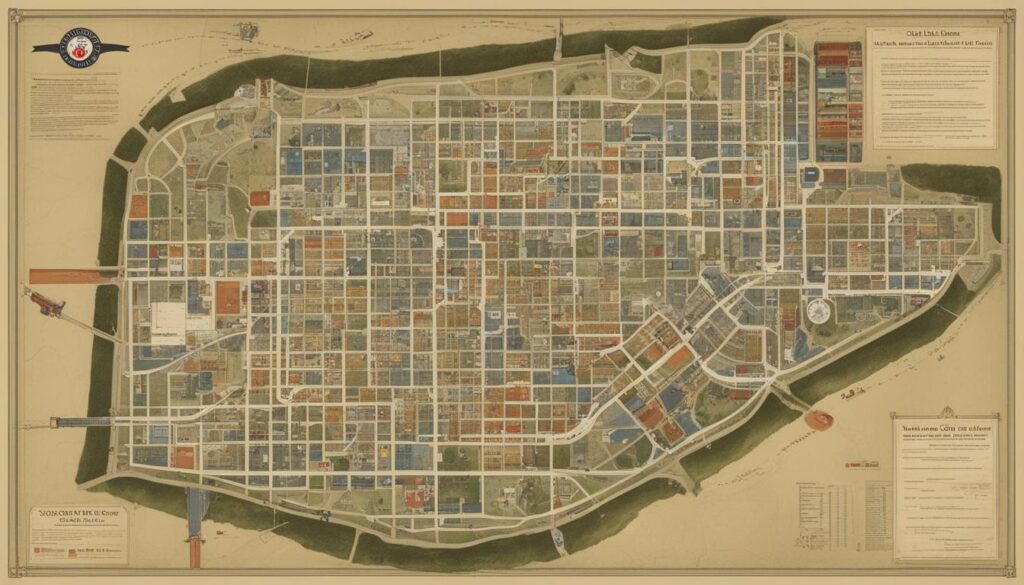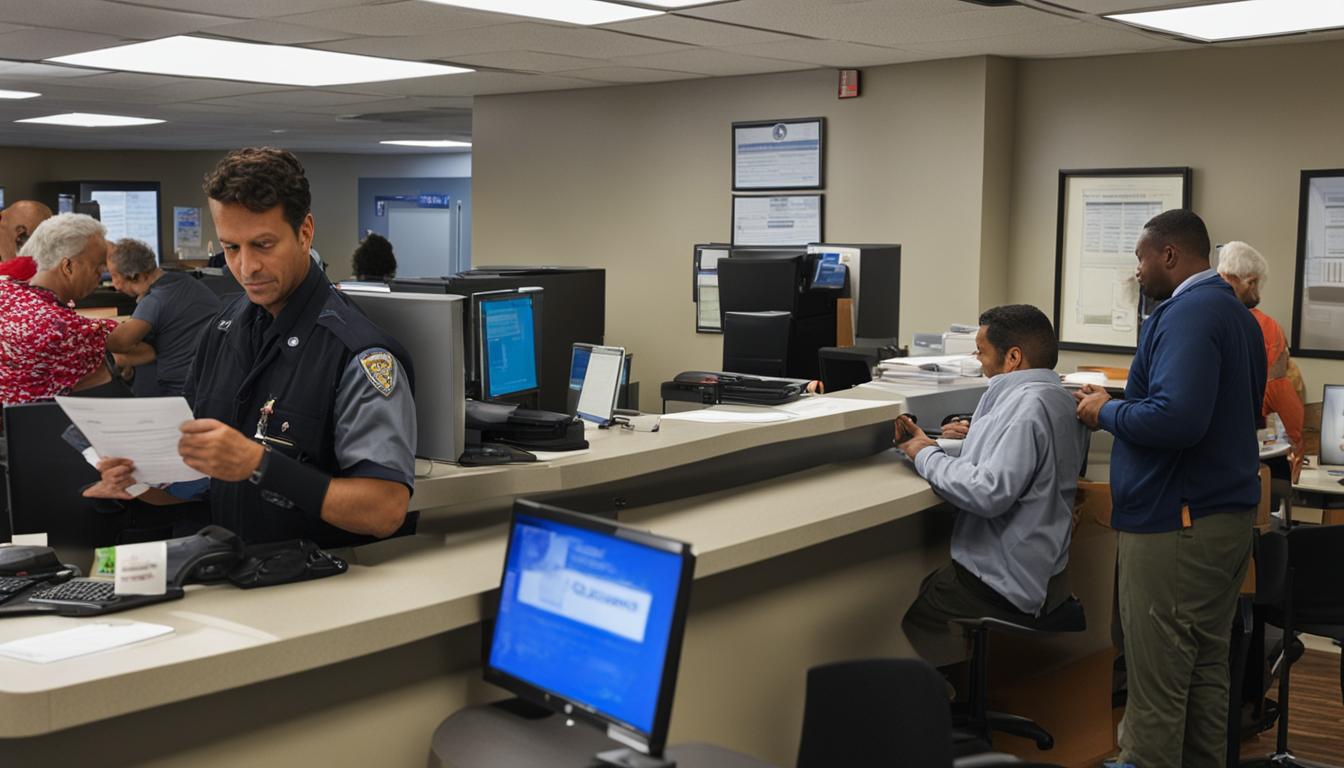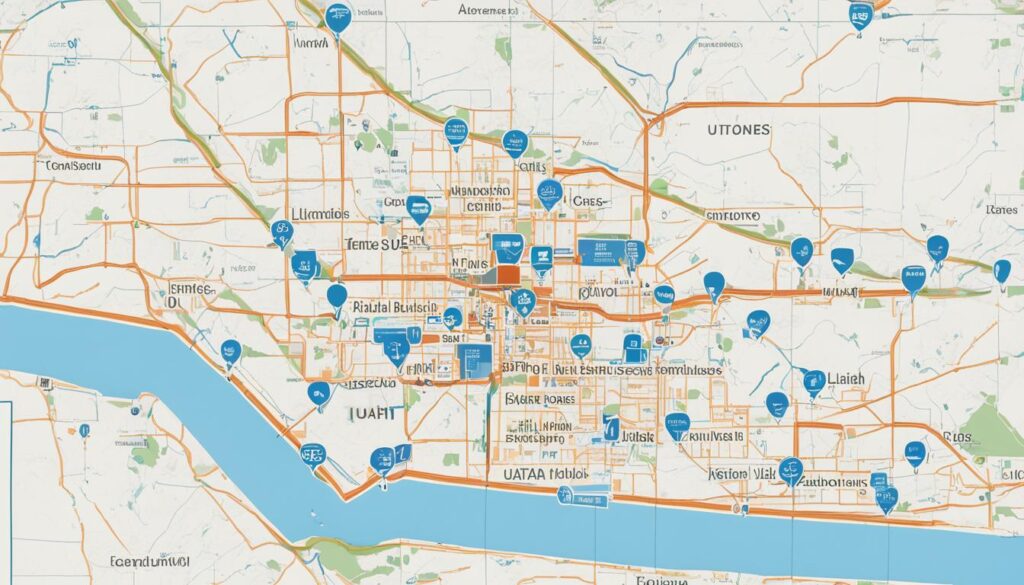Embarking on a business venture in the Buckeye State? Understanding how to get a business license in Ohio is a vital first step to ensure you’re laying a compliant foundation for your enterprise. In Ohio, the journey toward legal operation starts with registering your business with the Ohio Secretary of State. But that’s not the end of the road; you’re likely to navigate additional licensing waters. Whether it’s the maze of navigating the licensing process or submitting an Ohio business license application, the path can seem intricate. Fear not! Your entrepreneurial spirit paired with a grasp of the essentials will make the process manageable and straightforward.
Key Takeaways
- Begin by registering your business with the Ohio Secretary of State to comply with state laws.
- Investigate if your profession requires additional certifications or permits through Ohio’s eLicense system.
- Consult with professional associations or industry-specific boards for tailored licensing guidance.
- Prepare to engage with different licensing processes at state and local levels, depending on your business type and location.
- Remember that thorough research and preparation simplifies navigating the licensing process.
- Streamline your journey by leveraging resources available for an efficient Ohio business license application.
Understanding Ohio’s Business License Requirements
When you set out to launch your business in Ohio, getting on top of the ohio business license requirements is essential. It may seem daunting, but fear not—each step is navigable, and understanding the ins and outs of business license regulations in Ohio will clarify the process. Let’s peel back the layers of complexity together.
State vs. Local Jurisdictions
Navigating the labyrinth of licenses requires recognizing the interplay between state-level and local jurisdictional mandates. While the state performs certain registrations, your local municipality might impose additional permits and licenses depending on your business activities. Familiarize yourself with both to ensure full compliance.
The Role of the Ohio Secretary of State
The Ohio Secretary of State’s office is your starting point, overseeing the registration of businesses. Yet, the task of applying for a business license in Ohio does not end here. It’s your gateway to further industry-specific licenses which might be necessary for your business to operate legally.
Industry-Specific Licensing in Ohio
Depending on what your business does, you might need to dive deeper into specialized licenses. Reach out to the relevant Ohio business licensing agency, whether that’s for healthcare, food service, or another professional domain. Each industry has its unique set of requirements, and keeping abreast of these is pivotal for your business’s legal framework.
Starting Your Ohio Business: The Preliminary Steps
Embarking on the journey of starting your own business in Ohio is exhilarating, but before you dive in, it’s crucial to understand the essential steps to obtain a business license in Ohio. While Ohio does not issue a universal business license, you’ll likely need specific licenses or permits to operate legally within the state. These requirements vary depending on the nature and location of your new venture. The documents required for an Ohio business license are your starting point.
- Determine the Need for a Business License: Research if your business type requires a state-specific license or permit. Service industries often have different requirements than retailers or manufacturers.
- Check with Local Government: Since licensing requirements can differ from one municipality to another, checking with local city or county governments is a must. This ensures compliance with all regional regulations.
- Identify Required Documents: Gathering the necessary paperwork is a fundamental part of the process. Typical documents required for an Ohio business license include proof of business name registration, tax identification numbers, and sometimes a detailed business plan.
- Understand Vendor’s Permit Needs: If your business will engage in the sale of tangible goods or taxable services, acquiring a vendor’s or seller’s permit is often mandatory.
Getting your business off the ground with proper licensure is paramount. By following these outlined steps and securing all the necessary documents, you’re laying a solid foundation for your business’s future success in Ohio.
How to Get a Business License in Ohio
Embarking on the ohio business licensing process begins with a foundational aspect that sets the stage for your future endeavors. It’s about laying the groundwork for your enterprise in such a way that everything aligns with Ohio’s regulatory requirements. Securing a business name and structure is just the tip of the iceberg; let’s walk through the necessary steps to ensure your business is fully licensed and compliant. Your journey to acquiring an ohio business license will be a smooth one with these guidelines.

Securing Your Business Name and Structure
Your business identity matters, and in Ohio, it starts with choosing the right name and structure for your business. You’ll want to pick a name that not only reflects your brand but is also not already in use or too similar to other registered businesses. With that settled, determining your business structure – whether that’s a sole proprietorship, partnership, LLC, or corporation – can significantly impact your taxes, liability, and business operations.
Acquiring an Employer Identification Number (EIN)
If you’re forming a corporation, partnership, or multi-member LLC, securing an Employer Identification Number (EIN) from the IRS is a crucial step. This number will serve as your business’s social security number for all intents and purposes. Sole proprietors may use their social security number, but it’s often advisable to get an EIN to keep personal and business taxes separate – plus it’s free to apply for one on the IRS website.
Navigating the Ohio Business Gateway
The Ohio Business Gateway simplifies the ohio business license application by serving as a centralized online hub for all your business registration, licensing, and permitting needs. By using this platform, you can apply for the necessary vendor’s license if you’re selling taxable goods or services. It’s your one-stop-shop for managing the majority of your paperwork and ensuring you comply with the state’s regulatory framework.
By understanding and carefully following each of these steps, you’ll be on your way to legally operating your business in Ohio. Remember, thorough research and preparation when it comes to business licensing can save you a lot of time and trouble down the road.
Ohio Business Licensing Process: A Step-by-Step Guide
Embarking on the journey of obtaining a business license in Ohio can seem daunting, but by breaking down the process into manageable steps, you’ll navigate through the requirements with confidence. As you approach this critical phase, keep in mind that understanding ohio business license fees and collaborating with the ohio business licensing agency will be part of this comprehensive approach.
Step 1: Identify Applicable Licenses
Begin by determining which licenses and permits your business needs. Licenses can vary by industry, location, and even the specific services or goods provided by your company. Consult with the Ohio Business Gateway, they provide resources to help you understand the state-level licensing that applies to your sector.
Step 2: Prepare Necessary Documents
Gather your business name, Employer Identification Number (EIN), and details about your business structure. Be ready to show proof of insurance and your business plan, which should include financial projections. Accuracy and thoroughness during this step will streamline the rest of the process.
Step 3: Submit Your Application
With all your documents in hand, submit your application for a vendor license through the Ohio Business Gateway. For local licenses, look up your city or county’s official website as requirements may vary. Be prepared to pay any associated ohio business license fees at this stage.
Local Regulations: Acquiring Licenses in Your Ohio Municipality
As you set out to navigate the ohio business license application process, it’s crucial to understand that local regulations may differ significantly across Ohio’s numerous municipalities. Whether you’re establishing a startup in Columbus or expanding your boutique in a quaint town like Chagrin Falls, the local ohio business licensing process will require you to research specific regulations and engage with local authorities.
Understanding Vendor Licenses and Permits
If your business involves the sale of tangible goods or taxable services, a vendor license is non-negotiable. This license is your ticket to legally collect sales tax, an essential part of business compliance in Ohio. Keep in mind that the type of vendor license needed can vary based on your business location and the nature of your sales.
Research Your Local Business License Requirements
Moving beyond statewide mandates, individual cities or counties in Ohio may have their own set of rules and permits. From food service regulations in Cincinnati to home-based business ordinances in Dayton, your due diligence is paramount. Ensure to explore the specific licensing requirements laid out by your city or county’s administrative bodies, as these guidelines will invariably affect your business operations.
Engage with Local Authorities for Compliance
Establishing a clear line of communication with local government offices early on can save you from a world of regulatory headaches. Drop by your city hall, make a call to county officials, or attend local business meetings to fully understand the licensing landscape. This proactive approach could also reveal valuable insights about additional resources for your business, ensuring you’re not only compliant but also well-supported.
- Visit city or county websites for licensing information
- Contact local business associations for guidance
- Attend city council meetings for the latest updates on business regulations
Abiding by local standards is just as important as securing your state licenses. By mastering the intricacies of both state and local requirements, you position your Ohio business for prosperity within a solid legal framework.
Applying for a Vendor License in Ohio
If you’re venturing into the world of retail, either with tangible goods or taxable services, you’ll need to navigate the Ohio business licensing process. Your first step in applying for a business license in Ohio is to obtain a vendor’s license. This is a must-have for selling your products or services within the state. Whether you’re a traditional brick-and-mortar establishment or an online business, getting your vendor’s license puts you on the right track to operate legally.
To kick off your application process, consider these key actions:
- Visit the Ohio Business Gateway online to gain access to the vendor’s license registration platform.
- If you prefer in-person interactions, or if you’re near a local office, reach out directly to your county auditor who can also facilitate your registration.
- For those of you with business outside of Ohio that still serve Ohio residents, you must establish a seller’s use tax account, particularly if there’s substantial nexus with the state. Registration can be done through the Ohio Business Gateway or the Streamlined Sales Tax Registration System.
Remember, the key to a smooth registration experience is to have all your information ready before you start filling out forms. Ensure that your business details, tax identification numbers, and a thorough understanding of your tax obligations are at your fingertips.
Embrace the journey of obtaining your Ohio vendor’s license with confidence. The process is structured to be user-friendly, but it’s important to stay vigilant and informed about each step to ensure your business complies with state regulations. Establishing this legal foundation for your business is critical, and Ohio offers the resources to make it a streamlined endeavor.

- Double-check that you meet all the criteria outlined for applying for a business license in Ohio.
- Maintain meticulous records of the entire Ohio business licensing process, including confirmation numbers and official correspondence.
- Reach out for help if needed—you don’t have to navigate the procedure alone. Ohio has customer services and resources that can guide you.
By following these steps, you’ll ensure that your business is set up properly from the start, allowing you to focus on growth and prosperity in the Ohio market.
Ohio Business License Fees: What to Expect
When you’re setting up shop in Ohio, it’s important to keep in mind that your budget should account for various licensing fees that will arise during the ohio business licensing process. These fees can vary widely depending on several factors, including the industry you’re in, your business location, and the specific type of license you require. Understanding these costs upfront can help you avoid any surprises and ensure that your journey to obtain a business license in Ohio goes as smoothly as possible.
Vendor License and Other State Fees
The state of Ohio mandates a $25 registration fee for the vendor license, which is a necessity for businesses that intend to engage in the sale of tangible personal property or taxable services. But remember, this is just the starting point. There may be additional fees imposed by the state depending on the nature of your business and other specific licenses you may need to comply with state regulations.
Calculating Costs for Local and Industry-Specific Licenses
As you follow the steps to obtain a business license in Ohio, you’ll find that the costs can differ from one locale to another. A business in Cincinnati, for example, may face different fee structures compared to one in Toledo. This variance extends also to industry-specific licenses. The fees for a license for an arcade, a restaurant, or a consulting firm can differ greatly and depend on local ordinances as well as state requirements. It’s paramount to conduct thorough research or consult with local authorities to get a clear picture of all applicable ohio business license fees.
- Check with your city or county office for detailed information on local licensing fees.
- Engage with industry associations that can provide guidance on the licensing requirements and associated costs for your specific business type.
- Plan for these expenses in your business budget to ensure you’re financially prepared for the licensing process.
Maintaining Your Ohio Business License Compliance
As a diligent business owner, ensuring that your operations remain compliant is a cornerstone of your ongoing success in Ohio. Staying on top of licensing renewals and fees is not just about adhering to regulatory requirements—it’s about peace of mind and keeping the gears of your business smoothly turning.
Renewal Schedules and Fees
Depending on your industry and the specific professional licenses your Ohio business holds, you may need to renew your credentials either annually or every other year. It is vital that you’re familiar with the renewal schedules for each of your licenses to avoid unwanted lapses that can be costly both financially and operationally.
- Mark your calendar with the renewal dates specified by the Ohio business licensing agency to avoid oversights.
- Allocate a budget for the renewal fees well in advance to manage your cash flow effectively.
- Remember, vendor licenses typically do not require renewal, but always double-check for updates or changes.
Keeping Up with Regulatory Changes
In the ever-evolving landscape of business regulation, it’s imperative that you keep your finger on the pulse of any new legislative changes that could impact your operations. Regulatory adjustments could necessitate action on your part to renew a business license in Ohio or adapt your practices accordingly.
- Regularly check the official websites or bulletins from your industry’s regulatory bodies for updates.
- Engage with trade associations which can aid in navigating and assimilating these regulatory shifts.
- Consult with a legal professional if new legislation affects your business model, ensuring that all your licenses are in full compliance.
Conclusion
Navigating the intricacies of how to get a business license in Ohio can certainly seem daunting at first glance. Yet, it’s this very process that lays the foundation for your business’ compliance and, ultimately, its success. Remember, the Ohio business licensing process is tailored to guide you through various stages – from discerning state and local Ohio business license requirements to tackling registrations and renewals with ease.
With dedication to comprehending the requirements specific to your industry and locale, you can ensure that your business not only stands on solid legal footing but is also primed for thriving in Ohio’s dynamic marketplace. Your journey involves mounting the critical steps of registration, aligning with regulatory agencies, and maintaining diligence in the face of legislative changes.
Stay current with regulations, seek the necessary permits, and interact regularly with the Ohio Secretary of State and local clerks to achieve compliant operations. By doing so, you’re not only upholding legalities but also fortifying the integrity and reputation of your business. Here’s to your entrepreneurial spirit as you chart a course through Ohio’s rich business landscape!
FAQ
How do I start the process of getting a business license in Ohio?
Begin by checking with the Ohio Secretary of State to register your business and understanding state and local requirements for your specific industry. You’ll need to acquire an Employer Identification Number (EIN) if applicable, and determine the necessary licenses for your business type and location.
Do I need a business license for each Ohio municipality where I operate?
Yes, business license requirements can vary by local jurisdiction in Ohio. It’s essential to research and comply with the regulations in each municipality where your business will function. This may involve acquiring additional local licenses or permits.
What is the Ohio Business Gateway, and how does it relate to obtaining a business license?
The Ohio Business Gateway is an online platform that eases the process of registering and managing a business in Ohio. It allows you to apply for certain state-level licenses and permits, including the vendor license required for selling tangible goods and taxable services.
Are there any industry-specific licenses I may need in Ohio?
Yes, depending on your business type, you may need to secure industry-specific licenses or certifications. These are managed through various state departments or agencies, each with its own set of requirements and regulations.
What documents are necessary when applying for an Ohio business license?
You will generally need to provide your business name, EIN, a description of your business entity type, contact information, and often a Certificate of Insurance (COI) if required. Additionally, a detailed business plan with anticipated revenue can be helpful.
What are the costs associated with obtaining a business license in Ohio?
Costs vary based on the type of license and municipality. A state vendor license fee is , but other local and industry-specific licenses may have different fee structures. Make sure to check the applicable fees in advance.
How often do I need to renew my business license in Ohio?
While the state vendor license doesn’t require renewal, other professional and industry-specific licenses may need to be renewed periodically. Check with the issuing departments for renewal schedules and fee structures.
What is a vendor license, and do I need one for my business in Ohio?
A vendor license is required if you’re making retail sales of tangible personal property or taxable services in Ohio. It allows you to collect sales tax on these transactions. You will need to register for a vendor’s license through the Ohio Business Gateway or your county auditor.
Can I manage all my Ohio business licensing needs through the Ohio Business Gateway?
The Ohio Business Gateway covers many state-level business transactions, but not all licensing needs. Some industry-specific or local licenses will require you to engage with specific state departments or municipal authorities.
What if I make retail sales from outside of Ohio but to customers within the state?
If you have a substantial nexus in Ohio, you will need to register for a seller’s use tax account. The Ohio Business Gateway provides the means to register, as does the Streamlined Sales Tax Registration System.
How can I stay up to date with regulatory changes affecting my Ohio business license?
Regularly check in with the Ohio Secretary of State, the relevant licensing agencies, and local government websites for any updates on business regulations. Professional associations related to your industry can also be a valuable resource for staying informed about changes.




